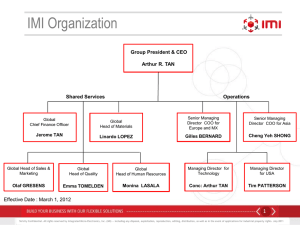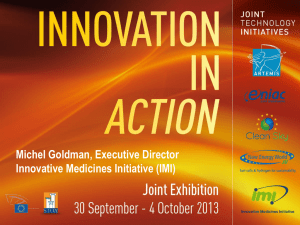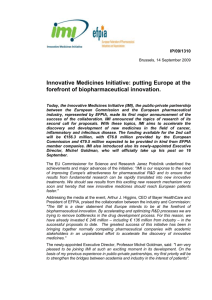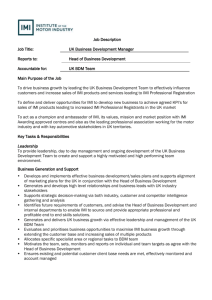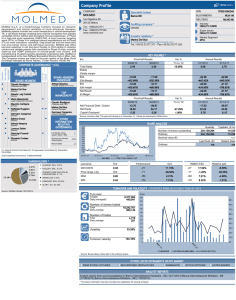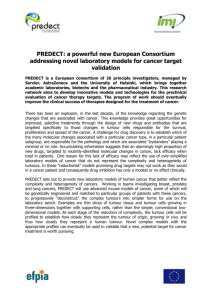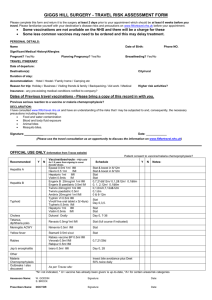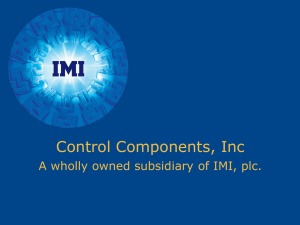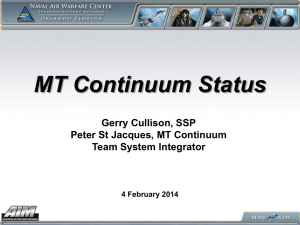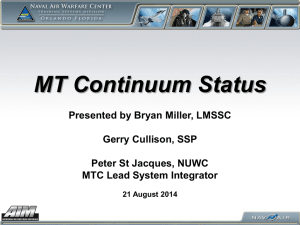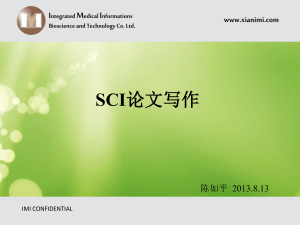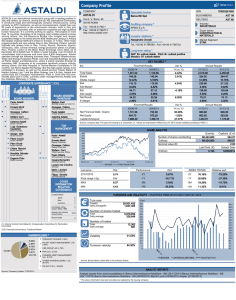Joining private and public forces to boost innovation in
advertisement
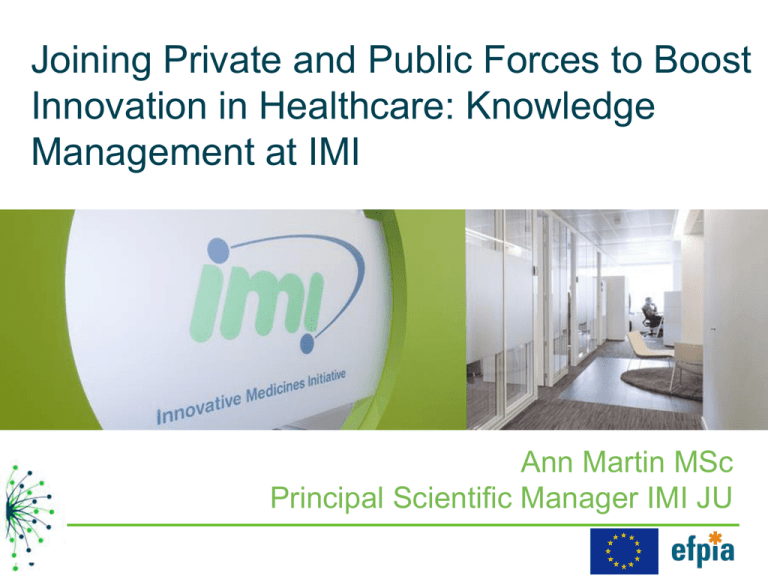
Joining Private and Public Forces to Boost Innovation in Healthcare: Knowledge Management at IMI Ann Martin MSc Principal Scientific Manager IMI JU Innovative Medicines Initiative: Joining Forces in the Healthcare Sector • Partnership European Commission & EFPIA • Objective: • More efficient Drug R&D leading to better medicines • Enhance Europe’s competitiveness in the pharmaceutical sector Key Hurdles in Pharma R&D Disease heterogeneity Lack of predictive biomarkers for drug efficacy/ safety Insufficient pharmacovigilance tools Unadapted clinical designs Societal bottlenecks Lack of incentive for industry Key Concepts “Non-competitive” collaborative research for EFPIA companies Open collaboration in public-private consortia (data sharing, wide dissemination of results) Competitive calls to select partners of EFPIA companies (IMI beneficiaries) Nature Medicine 18: 341, 2012 IMI JU and EFPIA commitments Million Euro as of October 2012 • • 7 Calls launched so far (42 projects) 1-(2) additional Call(s) to be launched in 2012 Key Figures of 37 on-going Projects 514 Academic & research teams 347 EFPIA teams €600 mln EFPIA ‘n kind contribution 91 SMEs € 603 mln IMI JU cash contribution 7 regulators 22 patient org ~ 3500 researchers > 240 publications R&D Productivity Improvements EFPIA Partners along IMI beneficiaries • companies in > 3 projects • > half the projects include > 9 companies • > half the companies are in > 9 projects Who participates from EFPIA ? 8 Projects Address Hurdles in R&D IMI improving R&D productivity Exploitation of data from multiple sources Schizophrenia Depression combined data analysis of 23,401 schizophrenia patients combined genetic data analysis on 2146 DNA samples Autism sequenced 78 Icelandic parent–offspring trios, a total of 219 distinct individuals (44 autistic, 21 schizophrenic offspring) and identified 4933 de novo mutations Chronic Pain pooled data from 43 past trials to understand the pain medicines mechanism of action and factors important in placebo response Safety building a toxicology information database utilising toxicology legacy reports to develop better in silico tools for toxicology prediction of new chemical entities (1274 reports extracted so far, 2092 were cleared, 3564 are planned in total) exploited EFPIA in vivo mouse and rat toxicology studies, tissue archives and molecular profiling data for >30 reference compounds to study NGC, genotoxic carcinogens and non-hepatocarcinogen controls Knowledge Management integrated 7 pharmacological information sources by providing a modular platform to query and analyze the linked data sources (>450 M triples) and developed 4 example applications Cellular Molecular In Silico prediction of Toxicities The Objective Collect, extract and organise pre-clinical toxicology data into a searchable database. Built in silico predictive systems to “foresee” major side effects Progress Developed in silico model to predict cardiac toxicity Tissue >3,500 reports delivered or in process ChOX DB: 175,401 compounds annotated to 427 targets with 705,415 activities extracted from 10,000 publications ArrayExpress: 20, 000 microarrays from tox studies on 130 compounds, 4315 microarrays from rat liver on 344 compounds 50 models already developed Ontology: 3917 terms and 2535 synonyms mapped and more on-going DDMoRe – The Vision Standards for describing models, data and designs Modelling Library Model Definition Language Shared knowledge Specific disease models Modelling Framework A modular platform for integrating and reusing models; shortening timelines by removing http://www.ddmore.eu barriers Examples from high priority areas http://www.ddmore.eu System interchange standards Open PHACTS: Public Domain Drug Discovery Data: Pharma are accessing, processing, storing & re-processing Public Domain Drug Discovery Data: Pharma are accessing, processing, storing & re-processing Literature Genbank Literature Genbank Patents PubChem Patents PubChem Data Integration Data Integration Downloads Downloads Databases Databases Data Analysis Data Analysis Firewalled Databases Firewalled Databases www.openphacts.org www.openphacts.org EMIF – European Medical Information Framework for patient level data Call 5 TBD Predictive screening EMIF - AD Risk factor analysis CNS Call 5 Risk stratification Patient generated data Research Topics EMIF - Metabolic Metabolic Prevention algorithms EMIF governance EMIF - Platform Data Privacy Analytical tools Semantic Integration Information standards Data access / mgmt IMI Structure and Network 20 eTRIKS European Translational Information and Knowledge Services • Objective: – Provision of a sustainable KM Platform and Service to support Private/Public Translational Research (TR) in IMI and beyond – Single access point to standardised curated TR study information • Project: – Built around J&J’s tranSMART open platform – Support: Hosting, Consulting, Curation (live and historic TR trials), Software development, Training, Analytics Methodology, Standards development, Ethics consultation. – Support of live IMI Efficacy & Safety projects: UBIOPRED, NEWMEDS, OncoTrack, PREDECT, Predict-TB, ABIRISK, ND4BB, MRC/ABPI-RA MAP. Data Intensive Sciences • Descriptive Metadata • Describe quality of the data • Use standards to ensure syntactic and semantic interoperability (Ref e-IRG Data Management Task Force 2009) IMI and the role of Standards CDISC project participant CDISC –IMI Memorandum of understanding CDISC membership Standards work on project basis CDISC membership EHR4CR Extends to IMI beneficiaries in IMI projects CDISC overview course BIOVAC-SAFE eTRIKS CDISC standards used in many BENEFITS Pharma and IMI beneficiaries use same standards Develop new standards where needed Preventing duplication of effort and resources Data Intensive Sciences • Cite standards (incl version) • Cite data ( use DOI) THANK YOU ! • Visit www.imi.europa.eu • Sign up to the IMI Newsletter • Follow us on Twitter: @IMI_JU • Join the IMI group on LinkedIn • Questions? E-mail us: infodesk@imi.europa.eu 25
